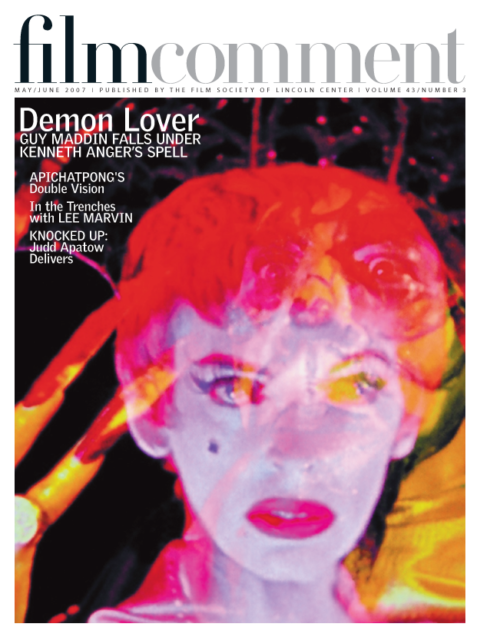
Sometimes accused of making films like Tsai Ming-liang, James Lee, one of the leading figures in Malaysia’s independent filmmaking explosion, once told me that Team America: World Police reminded him of Tsai—and in particular, the scene in which an angst-stricken animatronic pretty boy spews copious amounts of vomit in an alley behind a dingy bar. In order to appreciate Lee’s peculiarly incisive observation, two things need explaining. First, that Lee meant his conflation of the sex-istential longueurs of Taiwan’s second-most-celebrated contemporary filmmaker’s body of work and Trey Parker’s anti-American puppet-prop as an altogether knowing compliment. And second, that Tsai is, in fact, like Lee, a native Malaysian himself—and a crucial favorite of many of that country’s current, politically contentious cinephiles. And so with modern Malaysian cinema so stuck on Tsai, how timely it is that this prodigal son should at last come home with I Don’t Want to Sleep Alone, his latest meditation on fecal urban anomie and feverish “happy endings,” set among the slummiest side-streets and half-finished architectural skeletons of Malaysia’s monsoon-moist first city, Kuala Lumpur.
Like most movie homecomings, this one is a decidedly emotional affair—a reunion so violently torn between joy and revulsion that the character of Hsiao-kang, the director’s recurrent alter ego (embodied as ever by Tsai’s constant muse, Lee Kang-sheng), has himself been torn in two. When first seen, bald as a watermelon from The Wayward Cloud, Tsai’s pornographic 2005 anti-porn musical, he lies comatose in a hospital bed. (The strains of Die Zauberflöte on the boom box next to him are another residue of origins: the film was financed as part of the Mozart-celebrating New Crowned Hope project.) Soon, however, Hsiao-kang reappears, sporting a grubby grow-out of the carefully clipped facial hair he sported in his former life as a porn star in Tsai’s previous film. As he wanders the streets of K.L., intoxicating twangs of wailing dangdut, Bollywood bhangra, and Chinese opera hang in the air—along with increasingly choking wafts of mysterious smoke, which Government officials blame on illegal immigrant workers (and Tsai regulars will recognize as the latest elemental extension of the floods and droughts the filmmaker has revisited throughout his career). Is the bald Hsiao-kang dreaming the story of the hairy one? Is Rawang, the Indian guest worker who nurses Hsiao-kang after he takes a beating from a gang, some dream version of Tsai’s perennial leading lady Chen Shiang-chyi, back yet again to lust after Hsiao-kang—or at least to scour his supine body with a rag and a fistful of hospital soap?

As deeply divided about the potential dangers and delights afforded by Malaysia’s polyglot racial melting pot as he is devoted to rhyming and rewinding through his long-cherished chapbook of idiosyncratic themes and motifs, Tsai takes the opportunity to stud this love/hate letter to old K.L. with deeply embedded shards of political comment on everything from the denuding of the Malaysian rainforests to the debacle surrounding the ousting of former Deputy Prime Minister (and accused sodomite) Anwar Ibrahim. He also manages, even while focusing on K.L.’s grubbiest of housing conditions, to come up with his most gorgeously visualized film—his dalliance with Benoît Delhomme (who shot Tsai’s best-looking film, What Time Is It There? ) perhaps having finally made an impression on the director’s longtime cinematographer, Liao Pen-jung. Liao packs the new film’s every image with cubist enjambments of gloriously damp and moldering archi-texture, and treats the flooded concrete monstrosity where much of the movie unfolds as if it were some mad attempt by M.C. Escher to turn the Petronas Towers—and the economic boom they once symbolized—inside out.
For all those who found The Wayward Cloud something of a nightmare, take heart: I Don’t Want to Sleep Alone—which ends with a vision of fragile and drifting bliss as oneiric as anything in the swamp-moss-pherics of Andrei Tarkovsky—is nothing short of a dream. Oh, and about those sooty billows that turn Hsiao-kang’s (anti-)climactic make out session with Shiang-chyi into a paroxysmal coughing fit? Apparently, where there’s smoke, there’s fire: the Malaysian Censorship Board has banned I Don’t Want to Sleep Alone, citing some 18 instances in which the country is depicted, from a variety of cultural, ethical, and racial vantages, “in a bad light.” Following the recent bannings of Amir Muhammad’s The Last Communist and Village People Road Show, Tsai must feel right at home—and with most modern Malaysian filmmakers now regarding governmental condemnation as a badge of honor, it seems that for once even the censors got things right.








